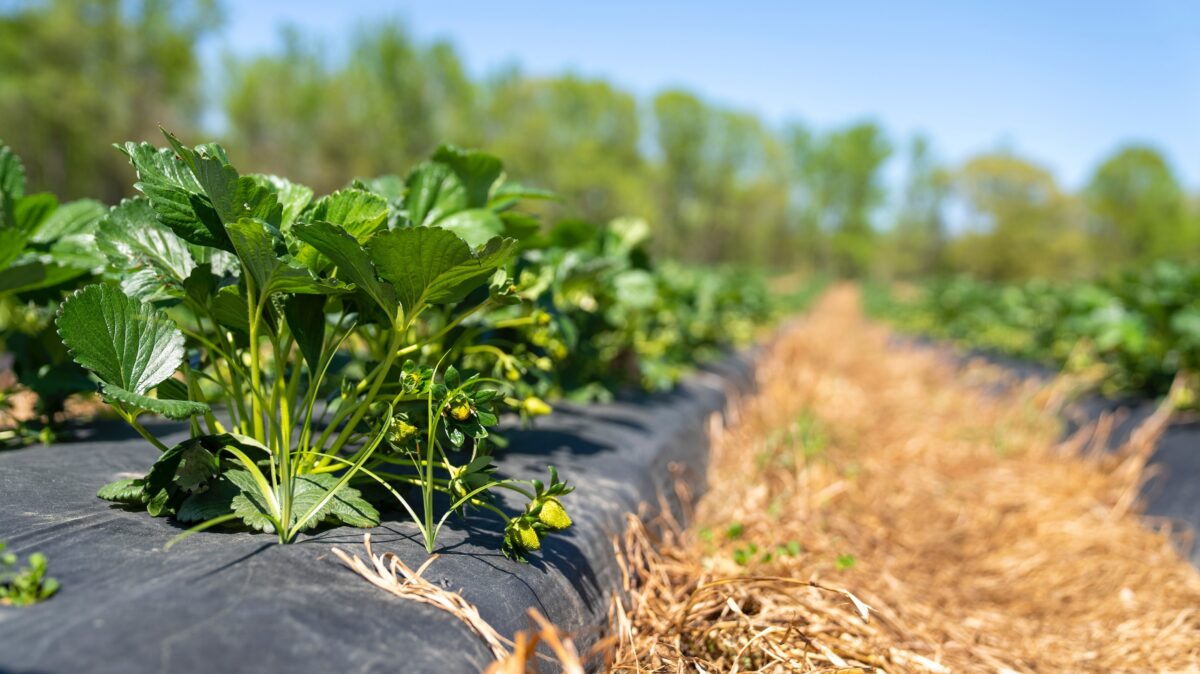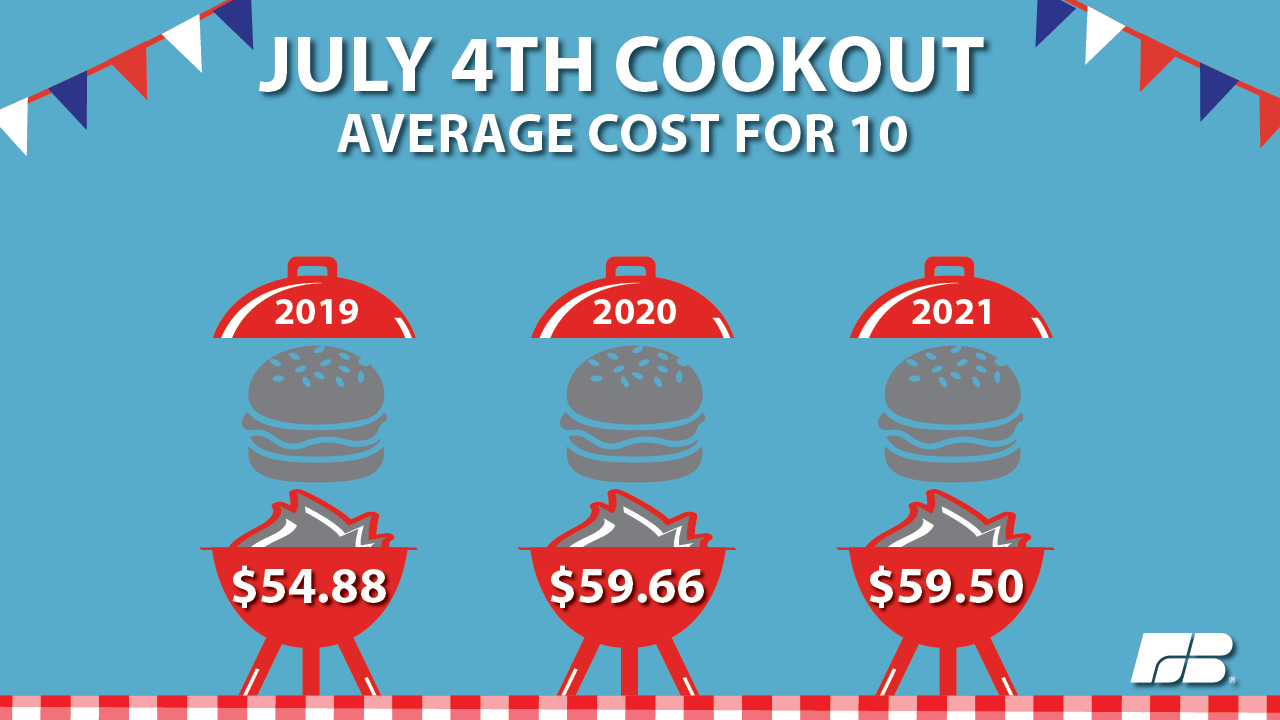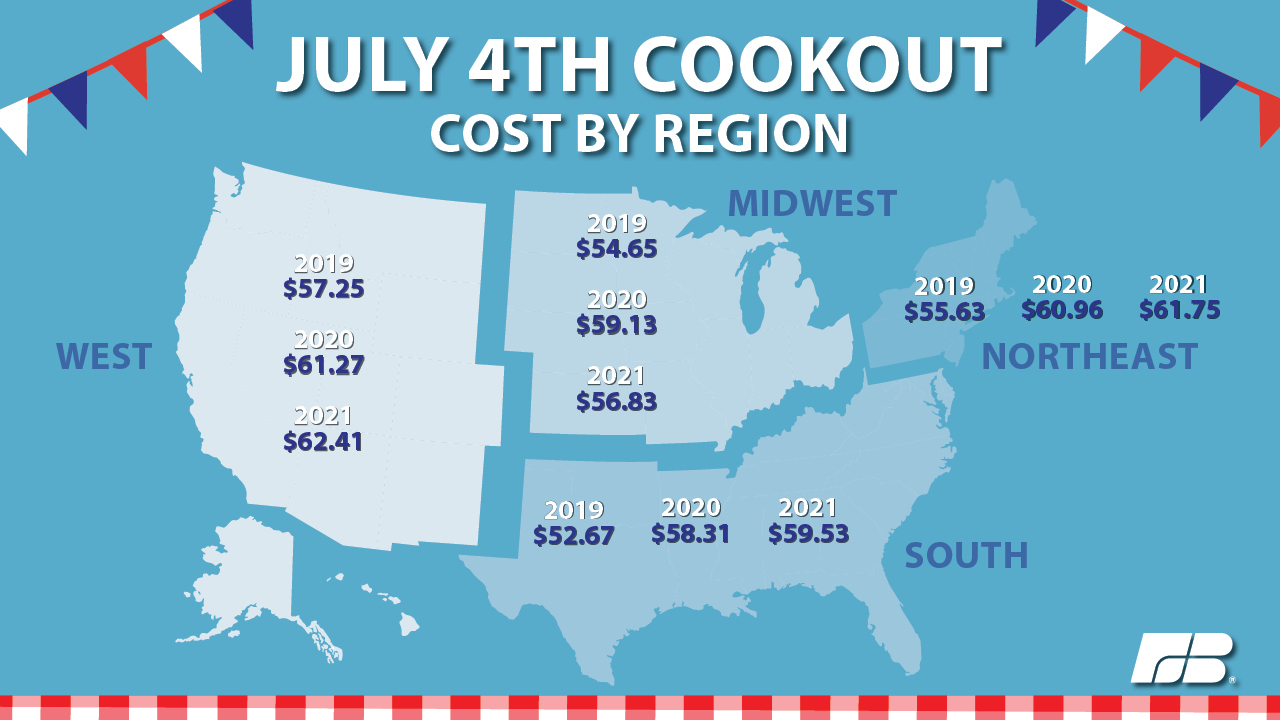Fire Up the Grill, Cookouts with Friends are Back!
TOPICS
Marketbasket Survey
photo credit: Mark Stebnicki, North Carolina Farm Bureau / CC0
Veronica Nigh
Former AFBF Economist
With restrictions on outdoor gatherings largely loosened across the country – grilling with friends is back! And just in time to enjoy the 4th of July holiday. But what will that cookout cost you? According to data from the Bureau of Labor Statistics and the annual Fourth of July marketbasket survey conducted by volunteer shoppers across the country on behalf of the American Farm Bureau Federation, the price of the 12-item July 4th Cookout that includes cheeseburgers, chicken breasts, pork chops, potato chips, pork and beans, fresh strawberries, homemade potato salad, fresh-squeezed lemonade, chocolate chip cookies and ice cream will cost $5.95 per person. In total, the cost for 10 people is $59.50, down 16 cents from last year. However, since the last time many of us entertained a group was in 2019, lining the 2021 cost up next to the 2019 cost is a more apt comparison. So, while the cost of the basket declined slightly compared to 2020, the cost was up nearly 8% compared to 2019. We dig in.
The Pandemic Effect
Before 2020, 45% of food was consumed away-from-home; However, this quickly changed during the pandemic. According to recent research, almost two-thirds of shoppers report cooking and eating at home far more. Further, as consumers spent less of their disposable income on travel, clothing and entertainment, including dining out, they had more flexibility in their budgets, which meant more money to spend at the grocery store. This increase in supermarket demand led to higher retail food prices in 2020 and 2021.
And while things are beginning to get back to normal, the desire to cook at home doesn’t seem to be subsiding. According to the same research, 92% of families aim to continue or increase home dining. This is good news for U.S. farmers, because, according to research from USDA’s Economic Research Service, the share of the food dollar that goes to the farmer for food consumed at home is 13.4%, compared to the 2.2% farmer share for food consumed away from home.
Finally, while one would expect that higher prices would lead to decreased quantity demanded, the amount of money Americans have in collective savings has shifted the demand curve, at least for now, leading to higher consumption even at higher prices. How significant are current savings? Well, according to data from the Bureau of Economic Analysis, during the decade that preceded the pandemic, personal savings in the United States averaged just over $1 trillion. In 2020 and through the first quarter of 2021, savings averaged $3.15 trillion, with the first quarter of 2021 clocking in at a whopping $4.25 trillion. All of this “cushion” in Americans’ budgets means that on whole, American consumers are currently less sensitive to price changes than perhaps they were in the past.
Of the 12 foods surveyed, seven decreased in average price compared to a year ago when prices were higher due to the pandemic. When compared to 2019, it flips to a majority of the foods rising in price; Prices for nine of the 12 food products increased over two years.

The Main Dish
Combined, the chicken breasts, pork chops and the hamburger meat account for 45% of the cost of the summer cookout, showing how much the meat case influences the overall cost of the cookout.
Beef and pork prices are lower compared to last year because packing plant disruptions early in the pandemic have been resolved. However, strong domestic and international demand have kept prices considerably higher than they were pre-pandemic. Ground beef is down 8% from last year, but up 7% from 2019. Pork chops are down 2% from last year, but still 13% higher than 2019. The demand for chicken breasts for fast food service is leading to increased prices in the grocery store, despite increased poultry production in 2021. Survey results showed 2 pounds of chicken breasts at $6.74, up 1% from last year and 9% from 2019.
Pass the Sides
The largest price increase in the cookout marketbasket is for strawberries. Survey results showed 2 pints of strawberries cost $5.30, up 22% from last year. The popularity of ready-to-eat fruits and severe weather during harvest this spring contributed to the increase. A 15-ounce bag of potato chips is down 1% from last year, but up 12% from 2019. The significant increase in cost between 2019 and 2020 suggests that these salty snacks were comfort food for many consumers, not just me.
The cost of homemade potato salad is largely driven by the cost of potatoes and eggs. Potatoes are up 6% in 2021 compared to 2020, but down 1% in 2021 compared to 2019. The ups and the downs of the demand side of the equation for potatoes, both in the fresh and processed sectors, were particularly challenging in 2020. The price of eggs is down 1% compared to 2020, but up 19% in 2021 compared to 2019. According to United Egg Producers, well over half of eggs produced in the U.S. were sold as shell eggs through retail outlets. The growth of home bakers during the pandemic is reflected in the higher 2021 egg prices relative to 2019.
The cost of fresh-squeezed lemonade is down 2% from last year and down 5% in 2021 compared to 2019. Though the cost of sugar is rising, the cost of lemonade is dropping with the price of lemons, which is down 3% in 2021 relative to 2020 and down 9% relative to 2019. Despite lower lemon production in the U.S., the price of lemons is down due to a smaller share of total lemon production being utilized for processing. The price of sugar is up 4% in 2021 relative to 2020 and up 16% relative to 2019. This increase in price is attributable to lower total U.S. sugar supplies on reduced imports and steady domestic production.
With milk production at a record-high and cheese production increasing, consumers will see lower cheese and ice cream prices this grilling season. Survey results showed American cheese is down 1% from last year and a half-gallon of ice cream is down 5%.
The cookout staple of pork and beans is down 13% in 2021 relative to 2020 and down 16% relative to 2019. This is likely a result of a 59% increase in dry bean production in 2020 relative to 2019. While the number of harvested acres of dry beans is down 17% in 2021 relative to 2020, there is still a lot of 2019 stocks to work through. Finally, the hamburger buns and the chocolate chip cookies are up 6% and 11%, respectively, this year compared to 2020 and up 7% and 20% compared to 2019. Given the degree of processing for both of these food items, the changes in price are more closely associated with changes in costs related to transportation, packaging, marketing and labor, rather than changes in the ingredients.
Let’s Get Regional
The survey reveals a difference in retail food prices depending on the region of the country, with a $5.58 spread from highest to lowest. The highest cost is in the West at $62.41, followed by the Northeast at $61.75 and South at $59.53, with the Midwest at $56.83.

Conclusion
Before the pandemic, food prices in the U.S. had remained stable as reflected in the cost of a July 4th cookout, which was relatively flat for five years. Like so many other things in our daily lives, the pandemic turned food consumption on its head, leading to more food consumed at home relative to food consumed elsewhere. This phenomenon, combined with high global demand for food, particularly meat, and a U.S. population with money to spend, has led to 8% increase in the price of the 2021 July 4th cookout relative to 2019. However, it’s important to keep in perspective that being able to feed 10 people for less than $60 – with a per-meal cost of less than $6 – is a testament to the affordability of food in the U.S.
Trending Topics
VIEW ALL